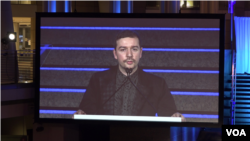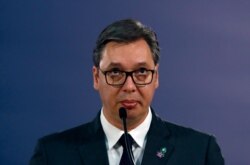A Serbian health minister who used his medical credentials to help mobsters avoid trial, a Belgrade mayor's dozens of personal bank accounts, ties between a convicted drug kingpin and Montenegro's president.
Stevan Dojčinović, the reporter behind some of the highest-profile scandals to hit the Western Balkans in 2018, was on hand to receive the 2019 Knight International Journalism Award at the 35th annual ICFJ dinner in Washington this week.
Honored alongside Marty Baron of The Washington Post, Elizabeth Palmer of CBS News and Rose Wangui of Nairobi-headquartered NTV, Dojčinović used his acceptance speech to warn about spreading nationalist tendencies.
"Many in the United States were shocked by the victory of Donald Trump, the Brexit turmoil, and the rise of populism, extremism and nationalism around the world," he said to an estimated 600 guests in attendance. "In Serbia and the countries in the shadow of Russia, we got a head start. I've been reporting on it in my country for decades.
"Finally, Eastern Europe does something first!" he quipped.
Founding editor of the Belgrade-based Crime and Corruption Reporting Network, KRIK, and a regional contributor to the International Center for Journalists-partnered Organized Crime and Corruption Reporting Project, OCCRP, Dojčinović has repeatedly been the target of threats and intimidation campaigns.
In its 2019 World Press Freedom Index, Paris-based Reporters Without Borders called Serbia a place where "practicing journalism is neither safe nor supported by the state." Since 2013, the news media watchdog group lowered Serbia's press freedom ranking from 63 to 90, on a scale of the 180 countries surveyed.
Last month, the executive producer of Serbia's privately owned N1TV blamed Serbian President Aleksandar Vucic for a recent campaign of harassment targeting the broadcaster and journalists throughout the country.
The Vucic government denies targeting N1TV or any reporters, and the president's media adviser, Suzana Vasiljevic, told VOA that Serbians enjoy a free press, and that neither Vucic nor his officials incriminate or harass journalists.
The Knight International Journalism Award is given once annually to reporters, editors or media professionals who have produced journalism of the highest standard in the faces of threats or unusually difficult circumstances.
This story originated in VOA's Serbian Service.





